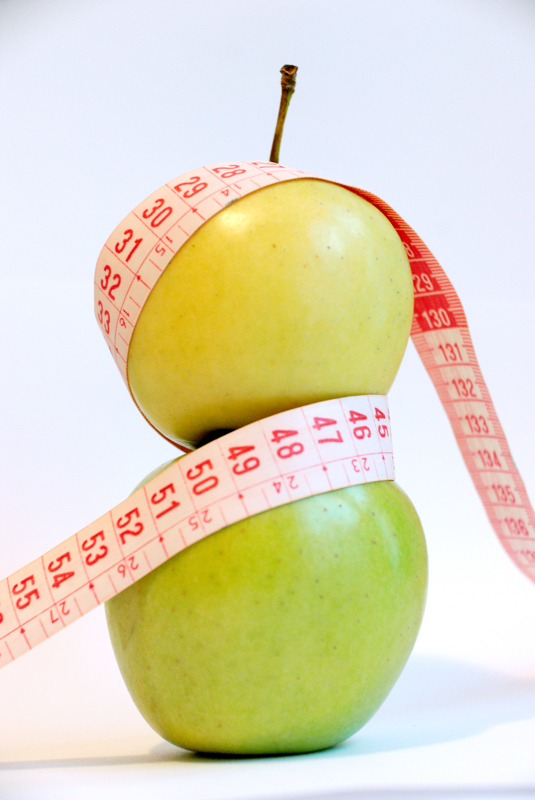You may have heard that you use more calories to digest celery than you gain from eating it. Is such a thing possible? Yes, and thanks to dietary thermogenesis. Depending on the macronutrient content of your food, you can actually burn more calories from digesting foods and turning them to heat or energy. This is one of three factors for weight gain or loss in an individual. Dietary thermogenesis makes up about 10% of the total energy expended in a day. Protein burns the most calories–up to 35% of ingested calories, because it is hard to digest, carbohydrates up to 30%, and fat usually 5% but up to 15% of calories. Spicy foods can increase the calories burned in dietary thermogenesis by raising the metabolism 20% for thirty minutes after consumption. Drinking water can also increase the thermogenetic effect, and a study has shown that by increasing water intake by 1.5 liters a day, a person will burn 17,400 additional calories in one year, resulting in a 5 pound weight loss.
Since the body’s preferred fuel is carbohydrates, a whole foods plant-based, high-carb low-fat diet (fruits and vegetables) is optimal for inducing dietary thermogenesis. Fat and protein should each contribute no more than 10% of total calories consumed, while carbohydrates should contribute a minimum of 80% of calories consumed. The World Health Organization recommends 6-10 grams of carbs daily per kilogram of body weight, and the body can store up to 15 grams of carbs per kilo (a kilo is about 2.2 pounds).
Carbs are stored “invisibly” as glycogen in the muscles and liver, not as fat. The body can store up to two pounds of glycogen, and excess carbohydrates are burned as heat through faculative dietary thermogenesis, or are burned through body movements (not just exercise). When food is consumed, the pancreas secretes insulin into the bloodstream to drive nutrients into cells. The metabolic rate rises while the cells build glycogen, which releases heat (burns calories). Carbs are most easily turned into glycogen, because they are already sugars. Eating cooked food instead of raw foods equals more calories absorbed since raw foods are harder to digest. Fruits are optimal for digestion because they are digested so quickly, but cooked high carb foods such as rice and potatoes will induce dietary thermogenesis as well.
Many people have been led to believe that carbohydrates or sugars will turn into fat, but de novo lipogenesis (DNL – process by which sugars are turned into fat by the body) is extremely taxing on the metabolism, and “does not occur under usual living conditions” according to Dr. Doug McDougall. A study by the University of California – Berkeley scientists concludes that “DNL is not the pathway of first resort for added dietary carbohydrates, in humans. Under most dietary conditions, the two major macronutrient energy sources (carbohydrates and fat) are therefore not interconvertible currencies; carbohydrates and fat have independent, though interacting, economies and independent regulation.” In other words, the body distinguishes between fat (store for future) and carbs (burn for energy), and is not likely to turn carbs into fat, a metabolically costly process. Thus, if you want to raise your metabolism, or the rate at which your body processes and expends energy–you should be eating a diet based on healthy, unprocessed carbs.
Conversely, calories from fat are stored in the liver and the body does not have any storage capacity for protein (excess is turned into urea, and secreted through urine)–possibly why the rate of dietary thermogenesis is so high for this particular macronutrient. As long as an individual is consuming enough calories, there is absolutely no need to worry about protein, which in excess is detrimental to the body. Too much of either fat or protein has proven to have ill effects ranging from cancer, osteoporosis, obesity, reduced liver and brain function, heart disease, as well as many others.
Of course, dietary thermogenesis is not the only factor in weight gain or loss. Body composition (muscles burn more calories than fat), activity, and basal metabolic rate all play important roles in regulating weight. Eating a high-carbohydrate diet, along with regular exercise, will lead to health and vitality, as well as a healthy weight–without calorie restriction.
I will add from personal experience and those of others I’ve come across: if you are coming from a calorie restrictive diet, you will gain weight once you begin to eat more calories. This absolutely normal, and typically water weight, as the body adjusts to eating more food after being deprived of it for however long. Obviously weight gain is not the most fun thing in the world for most people, but your body needs to heal and get used to digestion after being misused–it needs to learn to become an efficient fat burner, not a fat storer (calorie restriction causes the body to store fat because it is in survival mode). After your body can trust you to consume enough calories on a regular basis, you will be able to lose body fat without problems. This is a process, but it’s long term health we’re talking about, and completely worth it!
Related: What a Fruitarian Eats: 3 Day Food Journal
Why Calorie-Restrictive Diets Don’t Work
__
Photo: Gloria Garcia via Flickr





